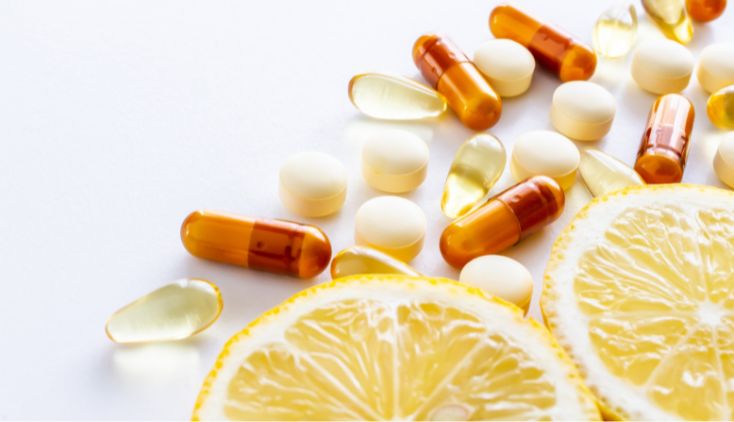Dealing with Hair Loss? Add These to Your Diet
Hair loss can be one of the biggest detriments to confidence for people of any age. Fortunately, there are tons of hair loss vitamins and supplements backed by science that can help you achieve a fuller hairline and slow hair loss naturally. Here’s a look at some of the best options for vitamins and supplements for hair loss to incorporate into your lifestyle.
1. Vitamin D
Vitamin D is an essential nutrient that plays a crucial role in many bodily functions, including hair growth. Studies have shown that individuals with deficiency in vitamin D are more likely to experience hair loss and thinning hair. This is because vitamin D helps in the production of new hair follicles, promoting healthy hair growth. With low Vitamin D, people are more subject to issues including on-scarring alopecias like:
- Telogen effluvium.
- Androgenetic alopecia.
- Alopecia areata.
- Trichotillomania.
It's easy to improve levels of Vitamin D with sun exposure and foods like fatty fish, egg yolks and liver. However, some people with low Vitamin D will often need to use supplements as recommended by their doctor.
If your hair is thinning or you're experiencing hair loss, it's worth checking your Vitamin D levels and speaking to your doctor who might recommend lifestyle changes or prescribe a supplement. More than 100 micrograms of vitamin D daily could be harmful, so check with your doctor.
2. Vitamin B Complexes
The Vitamin B complex is made of several different vitamins that work together to support healthy hair growth and cell metabolism. These include water-soluble vitamins of:
- Thiamine (B1).
- Riboflavin (B2).
- Niacin (B3).
- Pantothenic acid (B5).
- Vitamin B6.
- Biotin (B7).
- Folate.
- Vitamin B12.
Fortunately, all of these B vitamins can be obtained by eating a healthy diet, except for Biotin, which can only be made by the body. Of the Vitamin B complex, those associated with hair loss include riboflavin, biotin, folate and vitamin B12 deficiencies. Biotin deficiency, in particular, can be genetic or caused by issues like alcoholism and digestive issues. Fortunately, there is no evidence of Biotin deficiency, which means people can take biotin supplements to help with hair loss.
If you don't want to take supplements for hair loss, consider taking biotin and B-vitamin rich foods like:
- Organ meats.
- Eggs.
- Fish.
- Meat.
- Seeds.
- Nuts.
- Vegetables.
Of course, always talk to your doctor before starting any changes in diet or supplements. They can give you proper advice on the right amounts and types of biotin supplements to take, depending on your individual needs. It's generally recommended to take 30 mcg for adults and children over four years old.
3. Iron
While it's still debated whether iron deficiency leads to hair loss directly, research does show that low iron levels are tied to female and male pattern baldness. Iron is a vital mineral in the production of hemoglobin, which carries oxygen to all parts of your body including your hair follicles. Without enough iron, hair growth can be stunted and may even lead to shedding.
To ensure healthy iron levels, incorporate iron-rich foods into your diet such as:
- Red meat.
- Poultry.
- Leafy greens like spinach and kale.
- Whole grains.
- Legumes like lentils and beans.
If you suspect that you have low iron levels, it's important to consult with your doctor before taking any supplements. Taking too much iron can also be harmful, so proper medical guidance will be needed. Your doctor might also want to know if you have iron deficiency with or without anemia. If you do have anemia, which is a condition where the body doesn't have enough healthy red blood cells, your doctor may recommend iron supplements.
However, even if you don't have anemia, it's still important to maintain healthy iron levels for overall health and well-being. For people aged 19-50, the recommended daily intake of iron is 18mg, but this can change with pregnancy.
4. Vitamin A
Vitamin A can help improve skin and hair health, but too much vitamin A can also lead to hair loss. It's important to find a balance and only take the recommended amount of Vitamin A, which in most adults is around 900 mcg RAE for adults and children over four years old. RAE means "retinol activity equivalents" and is a measurement used for Vitamin A sources.
Foods high in Vitamin A include sweet potatoes, carrots, kale, spinach and liver. Fortunately, there are also other foods fortified with Vitamin A like milk available. If you feel you might be taking too much or too little Vitamin A, it's important to consult with your healthcare provider.
Final Notes
These vitamins and supplements are just the tip of the iceberg when it comes to improving hair health. Other factors that can contribute to healthy and strong hair include lifestyle choices and diet. Always talk to your healthcare provider before starting any new supplements or making drastic changes to your diet. By knowing how your vitamin and mineral levels and overall health are, you can start to make changes in your daily routine and diet that will lead to beautiful and strong hair.
